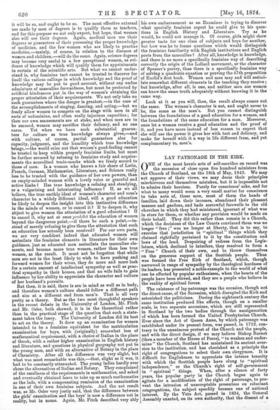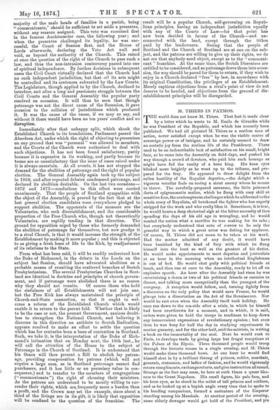L A.Y PATRONAGE IN THE KIRK.
ONE of the most heroic acts of self-sacrifice on record was the secession of close upon five hundred ministers from the Church of Scotland, on the 18th of May, 1843. We may not approve of their views, we may deem their principles mischievous and themselves mistaken, but it is impossible not to admire their heroism. Purely for conscience' sake, and for what to many would seem a very small matter for conscience to take note of, these men, most of them the heads of families, laid down their incomes, abandoned their pleasant manses and gardens, and bade sorrowful farewells to the old churches in which they had ministered, ignorant of what was in store for them, or whether any provision would be made on their behalf. They did this rather than remain in a Church, which the decisions of the Law Courts convinced them was no longer "free ;" was no longer at liberty, that is to say, to exercise that jurisdiction in " spiritual " things which they claimed rightfully pertained to it by the constitution and laws of the land. Despairing of redress from the Legis- lature, which declined to interfere, they resolved to form a "Free " Church of their own, and to throw themselves
on the generous support of the Scottish people. Thus was formed the Free Kirk of Scotland, which, though narrowed in range of sympathy by the theological hardness of its leaders, has presented a noble example to the world of what can be effected by popular enthusiasm, when the hearts of the people have been stirred, and they are a people who believe in the reality of spiritual forces.
The existence of lay patronage was the occasion, though not the direct cause, of the Secession, which disrupted the Kirk and astonished the politicians. During the eighteenth century the same institution produced like effects, though on a smaller scale, in two separate secessions, which are still represented in Scotland by the two bodies through the amalgamation of which has been formed the United Presbyterian Church. Ever since the Act of Queen Anne, by which patronage was established under its present form, was passed, in 1712, con- trary to the unanimous protest of the Church and the people, and with the direct design, if we may believe Bishop Burnet (then a member of the House of Peers), "to weaken and under- mine" the Church, Scotland has maintained its ancient aver- sion to the institution, and has cherished as a principle the right of congregations to select their own clergymen. It is difficult for Englishmen to appreciate the intense tenacity with which the Scottish people have clung to "spiritual independence," or the Church's right of self-government in " spiritual " things. When, after a silence of forty years, the popular party in the Church began again to agitate for a modification of the right of patronage, to pre- vent the intrusion of unacceptable presentees on reluctant congregations, the subject speedily became one of national interest. By the Veto Act, passed in 1834, the General Assembly enacted, on its own authority, that the dissent of a majority of the male heads of families in a parish, being "communicants, should be sufficient to set aside a presentee, without any reasons assigned. This veto was exercised first in the famous Auchterarder case, the following year ; and when the presentee challenged its legality, he was suc- cessful, the Court of Session first, and the House of Lords afterwards, declaring the Veto Act null and void, as beyond the authority of the Church. This raised at once the question of the right of the Church to pass such a law, and thus the non-intrusion controversy passed into one of spiritual independence. By further decisions in subsequent cases the Civil Court virtually declared that the Church had no such independent jurisdiction, but that all its acts might be controlled and its sentences subverted by the Law Courts. The Legislature, though applied to by the Church, declined to interfere, and after a long and passionate struggle between the Civil Courts and the General Assembly the popular party resolved on secession. It will thus be seen that though patronage was not the direct cause of the Secession, it gave occasion to the collision of jurisdictions which produced it. It was the cause of the cause, if we may so say, and without it there would have been no ten years' conflict and no disruption.
Immediately after that unhappy split, which shook the Established Church to its foundations, Parliament passed the Aberdeen Act, under which the right of objecting to presentees on any ground that was " personal " was allowed to members, and the Courts of the Church were authorised to deal with such objections. It has not been found satisfactory, partly because it is expensive in its working, and partly because its terms are so unsatisfactory that the issue of cases raised under it is always uncertain. At all events, it has not stopped the demand for the abolition of patronage and the right of popular election. The General Assembly again took up the subject in 1868, and after repeated debates condemned patronage, and declared its abolition desirable. On the last two occasions- 1872 and 1873—resolutions to this effect were carried unanimously. That the people of Scotland sympathise with the object of the Assembly, is proved by the fact that at the last general election candidates were everywhere pledged to support abolition. The opponents of the measure are the Voluntaries, who seek disestablishment, and the considerable proportion of the Free Church who, though not theoretically
Voluntaries, are rapidly tending in that direction. The ground for opposition urged by those who formerly demanded the abolition of patronage for themselves, but now grudge it to a rival Church, is that it would increase the strength of the Establishment by making it more popular ; and this is objected to as giving a fresh lease of life to the Kirk, by readjustment of its relations to the State.
From what has been said, it will be readily understood how the Duke of Richmond, in the debate in the Lords on the subject last Session, should have advocated abolition as a probable means of reuniting the scattered branches of Scotch Presbyterianism. The several Presbyterian Churches in Scot- land are identical in doctrine and principles of church govern- ment, and if patronage were abolished there is no reason why they should not reunite. Of course those who hold the sinfulness of all Establishments will not join one, but the Free Kirk has always maintained the principle of Church-and-State connection, so that it ought to wel- come a reform of the Established Church which would enable it to return to the parent fold. Whether that is likely to be the case or not, the present Government, anxious doubt- less to strengthen the National Church, and believing it discerns in this direction an antidote to Scotch Radicalism, appears resolved to make an effort to settle the question which has for centuries been a bone of contention in Scotland. Such, we take it, is the interpretation of the Duke of Rich- mond's intimation that on Monday next, the 18th inst., he will call the attention of the House to the subject of Patronage in the Church of Scotland. It is understood that his Grace will then present a Bill to abolish lay patron- age, providing compensation for patrons (which will not require a large sum, as in Scotland patronage cannot find purchasers, and it has little or no pecuniary value in con- sequence,) and to transfer to the members of congregations (" communicants ") the right of choosing their ministers. As the patrons are understood to be mostly willing to sur- render their rights, which are, frequently more a burden than a profit, and the Crown may set the example, since about a third of the livings are in its gift, it is likely that opposition will be confined to the question of the franchise. The
result will be a popular Church, self-governing on Repub- lican principles, having an independent jurisdiction equally with any of the Courts of Law—for that point has I now been decided in favour of the Church—and un- connected with the land, except through the tithes
paid by the landowners. Seeing that the people of Scotland and the Church of Scotland are at one on the sub- ject, and the patrons are willing to give up their rights, we do not see that anybody need object, except as to the "communi- cant " franchise. At the same time, the Scotch Dissenters are entitled to be considered, and as patronage drove them into seces- sion, the way should be paved for them to return, if they wish to enjoy in a Church declared " free " by law, in accordance with its original Constitution, the privileges of an Establishment. Merely captious objections from a rival's point of view do not deserve to be heeded, and objections from the ground of dis- establishment principles will be disregarded.



































 Previous page
Previous page